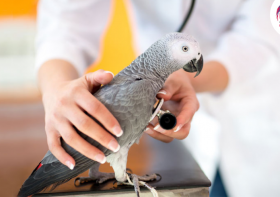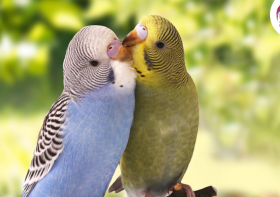How To Feed Pet Birds During Winter

Winter has come and the temperatures are dropping with mist everywhere. A cold winter can be hard on our feathered friends. Birds typically feed on seasonal seeds and grains. Further they are also sensitive to the changing seasons. What to feed birds in winter? Is the question that nags the mind of people, especially when the days are getting shorter and the nights are prolonging. There are plenty of foods that you can give to birds in winter which makes them to sustain through the cold months ahead. You need to be aware what you feed and how you feed to your pet bird and especially during winter this becomes a prime role. Here are some tips on feeding your feathered friends during winter.
Best foods for birds during winter season
- Black-oil sunflower seeds- Black-oil sunflower seeds have a higher fat content than the other seeds, and so make a great winter staple diet. They provide the most energy per pound of any typical bird seed and are the best choice for easily metabolizable fats and oils.
- Peanuts – Birds love nuts. Nuts provide good nutrition and essential calories to birds. Shelled, dry-roasted and unsalted peanuts provide an ample amount of protein and fat, so they are a good fuel for birds in winter. You can also feed peanut butter, but make sure it’s unsalted as the salt can harm the birds.
- Cheese – Grated mild cheddar cheese is readily accepted by many birds during the more severe weather and can be very beneficial to them. This provides a great boost in calories and protein to a wide range of birds, in the winter season.
- Fruits – Just like humans need fruits in their diet for vitamin requirements, birds need them too. Fruits provide essential vitamins and help in enhancing growth and immunity in birds. Fruits such as apples, citrus fruits, and pears provide great nutrition to birds in winter. Chop the fruits into small chunks so it’s easier for smaller birds to enjoy.
- Mixed seeds – Mixed seeds are the best food option for birds irrespective of seasonal changes. Mixed seeds are rich in necessary protein and unsaturated fats. Pick a seed mix with a large amount of black-oil sunflower seed, cracked corn, and white proso millet. You can also make a seed blend from the seeds mentioned above.
Foods to be avoided for birds during winter season
- Bread – Bread has less nutritional value and will fill up their stomachs soon, in turn they won’t eat enough seeds, grains, fruits, and fats to keep them healthy throughout the winter season.
- Rotten food -Providing rotten food to your birds can lead to harmful bacterial infections which can cause severe illnesses in birds. Ensure that the food you provide is fresh and healthy for them.
- Excess salt – Just as too much salt isn’t good for humans, it isn’t good for birds either. Excess salt intake is toxic for birds and might affect the bird’s nervous system. Avoid feeding heavily salted foods like meats, crackles, or salted nuts.
- Milk – Do not include milk in your birdie’s winter diet. It results in sickness and diarrhea which might cause dehydration. This is especially dangerous for birds in winter, as their water intake is less in winter when compared to other seasons.
How best to feed birds in winter?
Feeding birds in winter sounds easy but makes a huge difference to the health and well-being of birds. Different birds have different tastes and favorite foods, you need to understand your bird’s needs better and feed accordingly. You can also come up with your own recipes for winter treats for birdies. Try experimenting with new recipes to make your birdie’s diet healthy and tasty. Water is as important as food is. Make sure to provide ample amount of freshwater to your birds.
We hope you enjoyed the article and found it useful for the winter season. Please let us know what you thought of this blog in the comments below. Also, if you liked this blog, please share it with your friends and feel free to check out our other articles on the Website. If you have any other questions about how to take good care of your feather friend, please feel free to contact us. Our team would love to get in touch with you and assist you and your birdie in the best possible way. You can also leave your queries in the comments and we’ll be sure to answer them!
Deprecated: ltrim(): Passing null to parameter #1 ($string) of type string is deprecated in G:\PleskVhosts\spinzsuntanremover.com\redbellydiagnostics.com\blogs\wp-includes\wp-db.php on line 3031
Deprecated: Creation of dynamic property WP_Term::$object_id is deprecated in G:\PleskVhosts\spinzsuntanremover.com\redbellydiagnostics.com\blogs\wp-includes\class-wp-term.php on line 198
Deprecated: Creation of dynamic property WP_Term::$object_id is deprecated in G:\PleskVhosts\spinzsuntanremover.com\redbellydiagnostics.com\blogs\wp-includes\class-wp-term.php on line 198
Deprecated: Creation of dynamic property WP_Term::$object_id is deprecated in G:\PleskVhosts\spinzsuntanremover.com\redbellydiagnostics.com\blogs\wp-includes\class-wp-term.php on line 198
Deprecated: Creation of dynamic property WP_Query::$comments_by_type is deprecated in G:\PleskVhosts\spinzsuntanremover.com\redbellydiagnostics.com\blogs\wp-includes\comment-template.php on line 1525




Leave a Reply